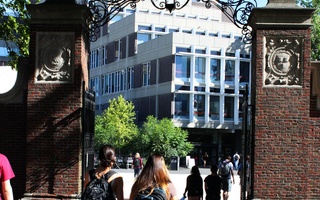II. EXECUTIVE SUMMARY
The 1999 survey of undergraduates conducted by Axiom Research Company (ARC) on behalf of Harvard University Health Services (HUMS) indicates that HUHS fares generally well among undergraduates. In particular, students give HUHS high ratings for its physicians and nurse practitioners, and for the convenience it provides. Furthermore, the study shows that HUHS has made some significant improvements over the past few years. Most notable, the level of satisfaction with HUHS health care overall has improved. In 1992, a total of 20% of students rated their satisfaction as "very good" or "excellent". In 1999, this number increased to 29%, with the greatest increase occurring among those who rate their satisfaction as "very good". Furthermore, the percentage of students who rated the overall quality of care and services provided by HUHS to be "very good" or "excellent" has increased from 29% in 1992 to 34% in 1999.
Despite this good news, this study does reveal that a core group of students continue to be unsatisfied with the care and services that HUHS provides. With the exception of specialty services, at least one third of students are dissatisfied with each type of service offered by HUHS. Furthermore, while a slight majority of students would recommend HUHS to others in the Harvard community, almost as many would not recommend it. The primary reasons for this dissatisfaction appear to be the delays, the misdiagnoses, the poor attitudes of staff members, and the care given by some providers at HUMS. Students who tend to be most dissatisfied are those without a PCP or those who are unaware of the benefits and services to which they are entitled as Harvard University undergraduates.
It is clear that HUHS has made some improvements in these areas over the past seven years. This study highlights the importance of not only continuing, but stepping-up those efforts, particularly those aimed at improving access to care, boosting staff morale, educating students to the health benefits to which they are entitled, and ensuring students have and like their PCP. Clearly, these goals cannot be achieved by any one department of the HUHS system, but through teamwork between the administrative executives, reception staff, and caregivers.
Page 4
A. Overall Satisfaction
Although a majority of students (58%) say they are satisfied ("good" or better) with HUHS health care overall, this consists of only 3% who gave the highest rating of "excellent". Furrthermore, a substantial number of students (41%) say they are dissatisfied ("fair" or "poor"). This pattern holds true for a variety of aspects of care, however, overall levels of satisfaction are slightly higher in some areas.
Specialty Services. 81% of students gave favorable ratings to satisfaction with specialty services, with 14% giving a rating of "excellent." Approximately two in ten (19%) gave unfavorable ratings.
Quality of Care. Close to two out of three (66%) students gave favorable ratings to satisfaction with quality of care, with 7% giving a rating of "excellent." One in three (34%) gave unfavorable ratings.
Mental Health. Similarly, two out of three (65%) gave favorable ratings to satisfaction with Mental Health Services, with 10% giving it a rating of "excellent." Slightly over one third (36%) gave unfavorable ratings.
After Hours. 57% of students gave favorable ratings to satisfaction with the After Hour Urgent Care Clinic, with 8% giving it a rating of "excellent." Over four in ten (42%) gave unfavorable ratings.
While office practices and administrative issues such as delays and courtesy of receptionists are correlated with overall satisfaction, care-related factors are of greater significance. Specifically, overall satisfaction is strongly correlated with:
"extent to which your concerns were addressed by the physician or nurse practitioner,"
Read more in News
Medical School to Build $300M Research FacilityRecommended Articles
-
LettersUHS Committed to Aiding Sexual Assault Victims To the editors: The mission of Harvard University Health Services (HUHS) is "To
-
Preventing Dental Debt and Decay"Despite a lifetime of dedicated brushing, flossing and checkups, I just had to have a root canal and crown on
-
Health Plans To Adhere to HHSHarvard University Health Services may have to make adjustments to its insurance offerings based on a decision last week that college health insurance plans must adhere to regulations contained in the Affordable Care Act.
-
UHS Advises Students To Carefully Consider New ACA Health OptionsAs the White House works to repair the technological glitches that impacted the rollout of the new online health exchanges created by the Affordable Care Act, University Health Services has a clear message for students: think carefully before jumping onto a new plan.
-
ACA Has Little Impact on University Health Plan EnrollmentBarreira noted in his email that since UHS does not ask for the reason why a student elects to waive the Student Health Insurance Plan, it is difficult to know how the Affordable Care Act impacted that decision.
-
 Harvard Yard Goes Tobacco-Free
Harvard Yard Goes Tobacco-Free













